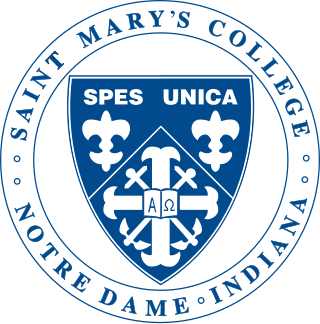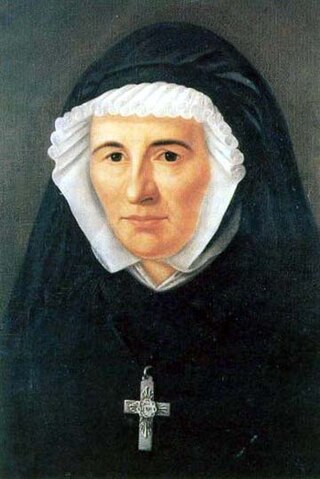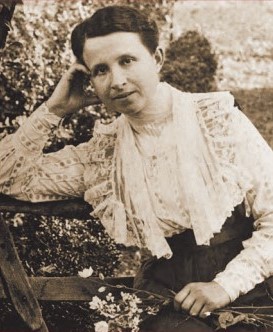Related Research Articles
Leroy Matthiesen was an American prelate of the Roman Catholic Church. He served as the sixth bishop of the Diocese of Amarillo in Texas from 1980 to 1997.

Edward Frederick Sorin, C.S.C. was a French-born priest of the Congregation of Holy Cross and the founder of the University of Notre Dame in Indiana and of St. Edward's University in Austin, Texas.

Anne Thérèse Guérin, designated by the Vatican as Saint Theodora, was a French-American saint and the foundress of the Sisters of Providence of Saint Mary-of-the-Woods, a congregation of Catholic sisters at Saint Mary-of-the-Woods, Indiana. Pope John Paul II beatified Guérin on 25 October 1998, and Pope Benedict XVI canonized her a saint of the Catholic Church on 15 October 2006. Mother Guérin's feast day is 3 October, although some calendars list it in the Roman Martyrology as 14 May, her day of death.

Saint Mary's College is a private Catholic women's liberal arts college in Notre Dame, Indiana. Founded in 1844 by the Sisters of the Holy Cross, the name of the school refers to the Virgin Mary.

Mary Frances Xavier Warde R.S.M. (1810-1884) was one of the original Sisters of Mercy, a Roman Catholic religious congregation of women founded in Ireland by Catherine McAuley, and the foundress of the order in the United States.

The Roman Catholic Archdiocese of Galveston–Houston is a Latin Church ecclesiastical jurisdiction—or archdiocese—of the Catholic Church in the United States. The diocese covers a portion of Southeast Texas, the other being the Roman Catholic Diocese of Beaumont.
The Sisters of the Holy Cross are one of three Catholic congregations of religious sisters which trace their origins to the foundation of the Congregation of Holy Cross by Fr Basil Moreau in Le Mans, France in 1837. Members designate themselves with the post-nominals CSC.
The Congregation of the Sisters of Charity of the Incarnate Word is the name of two Roman Catholic religious institutes based in the U.S. state of Texas. They use the abbreviation C.C.V.I..

Claude Marie Dubuis was a French-born prelate of the Roman Catholic Church. He served as the second bishop of the Diocese of Galveston in Texas. from 1862 until his death in 1892. He founded the Sisters of Charity of the Incarnate Word.

The Congregation of Divine Providence is the name of two Roman Catholic religious institutes of women which have developed from the work of Jean-Martin Moye (1730-1793), a French Catholic priest. They are dedicated to the instruction and care of the neediest of the world.

Maurice Feltin was a French cardinal of the Roman Catholic Church. He served as Archbishop of Paris from 1949 to 1966, and was elevated to the cardinalate in 1953 by Pope Pius XII.

The Religious of Jesus and Mary, abbreviated as R.J.M., form a Roman Catholic religious congregation of women dedicated to the education and service of the poor. It was founded at Lyon, France, in October 1818, by Claudine Thévenet.

Nicolaus Aloysius Gallagher was an American prelate of the Roman Catholic Church. He served as bishop of the Diocese of Galveston in Texas from 1892 until his death in 1918.

Maria Faustyna Kowalska, OLM, also known as Maria Faustyna Kowalska of the Blessed Sacrament, was a Polish Catholic religious sister and mystic. Faustyna, popularly spelled "Faustina", had apparitions of Jesus Christ which inspired the Roman Catholic devotion to the Divine Mercy and earned her the title of "Secretary of Divine Mercy".

Mother Mary Cleophas Foley, S.P., was the Superior General of the Sisters of Providence of Saint Mary-of-the-Woods, Indiana from 1890 to 1926. During her time in office, she completed the building of the Church of the Immaculate Conception and built numerous other buildings at Saint Mary-of-the-Woods, Indiana, including a new Providence Convent, the Blessed Sacrament Chapel, and an infirmary.
Catholic sisters and nuns in the United States have played a major role in American religion, education, nursing and social work since the early 19th century. In Catholic Europe, convents were heavily endowed over the centuries, and were sponsored by the aristocracy. Religious orders were founded by entrepreneurial women who saw a need and an opportunity, and were staffed by devout women from poor families. The number of Catholic nuns grew exponentially from about 900 in the year 1840, to a maximum of nearly 200,000 in 1965, falling to 56,000 in 2010. According to an article posted on CatholicPhilly.com, the website of the Archdiocese of Philadelphia, Pennsylvania, in October 2018, National Religious Retirement Office statistics showed that number as 47,160 in 2016, adding that “about 77 percent of women religious are older than 70.” In March 2022, the NRRO was reporting statistics from 2018, citing the number of professed sisters as 45,100. The network of Catholic institutions provided high status lifetime careers as nuns in parochial schools, hospitals, and orphanages. They were part of an international Catholic network, with considerable movement back and forth from Britain, France, Germany and Canada.

Margaret Mary Jane Healy Murphy, SHSp was an Irish-American Catholic religious sister and early civil rights activist. She known for founding the Sisters of the Holy Spirit and Mary Immaculate, the first order of sisters in the state of Texas, as well as the first free private school for African Americans in San Antonio, Texas.
Sister Elizabeth Anne Sueltenfuss was an American educator and Catholic sister.

Marie-Eugénie Caps (1892-1931) was a French Catholic sister who founded the Congregation of the Missionary Sisters of the Holy Spirit or Spiritaines or Spiritan Sisters in January 1921, at the age of 28.
References
Citations
- 1 2 3 4 5 6 7 8 9 Callahan, Mary Generosa (12 June 2010). "Feltin, Louise". Handbook of Texas Online. Texas State Historical Association. Retrieved 14 December 2015.
- 1 2 Roesch, Karen (2012). Language Maintenance and Language Death: The Decline of Texas Alsatian. Amsterdam: John Benjamins Publishing Company. pp. 11, 48–49. ISBN 9789027202888.
- 1 2 3 Callahan 1955, p. 91.
- ↑ "Heritage: Texas 1866". Congregation of Divine Providence. Archived from the original on 11 March 2005. Retrieved 14 December 2015.
- ↑ Callahan 1955, p. 80-81.
- ↑ Callahan 1955, p. 81.
- ↑ Callahan 1955, p. 82.
- ↑ Callahan 1955, p. 85-86.
- ↑ Callahan 1955, p. 90.
- ↑ Callahan 1955, p. 94-95.
- ↑ Callahan 1955, p. 94.
- ↑ Callahan 1955, p. 96.
- ↑ Callahan 1955, p. 98.
- ↑ Callahan 1955, p. 101.
- ↑ Callahan 1955, p. 102-103.
- ↑ Callahan 1955, p. 92.
- ↑ Callahan 1955, p. 93.
- ↑ Callahan 1955, p. 110-111.
- ↑ Callahan 1955, p. 117.
- 1 2 3 Butler, Anne M. (15 May 2012). "Nuns on the Frontier". The New York Times. Retrieved 14 December 2015.
- ↑ Callahan 1955, p. 136-137.
- 1 2 Butler, Anne M. (2012). Across God's Frontiers: Catholic Sisters in the American West, 1850-1920. Chapel Hill, North Carolina: University of North Carolina Press. p. 160. ISBN 9780807835654.
- ↑ Thompson, Margaret Susan (1986). "Discovering Foremothers: Sisters, Society, and the American Catholic Experience". U.S. Catholic Historian. 5 (3): 273–290. JSTOR 25153765.
- ↑ Thompson, Margaret Susan (1997). "Introduction". Building Sisterhood: A Feminist History of the Sisters, Servants of the Immaculate Heart of Mary. Syracuse University Press. p. 9. ISBN 0815627378.